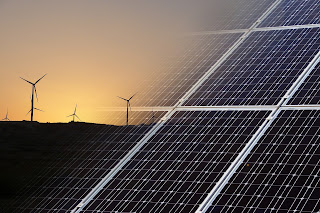GREEN HYDROGEN: An Opportunity for India-Africa Cooperation – ORF
By Apoorva Lalwani – Observer Research Foundation
Although India and Africa have long shared close ties, engagement between the two regions is yet to reach its full potential. However, amid the global green transition and attempts to enhance energy security, green hydrogen—increasingly seen as the ‘fuel of the future’—could provide a new avenue for cooperation between the regions. Such a partnership, focused on building a global value chain for the large-scale adoption of green hydrogen, will accrue long-term socioeconomic benefits for India and African countries.
Introduction
Trade relations between India and Africa go back centuries, when merchants crossed the seas in search of precious metals and gemstones. A shared colonial history also saw the migration of Indian labourers to several African countries, such as Mauritius and Madagascar. Over time, trade ties have expanded substantially, with India now Africa’s fourth-largest trading partner (India’s total trade with Africa was valued at US$68.33 billion in 2019-2020). The relationship between India and the African countries was cemented in 2008 with the establishment of the India-Africa Forum Summit. While the platform initially focused on rising oil and food prices, it expanded its scope to other mutual concerns—such as health, technical assistance, and climate change—in subsequent meetings.
Engaging with Africa is a key priority for the Indian government. To advance its diplomatic reach in the region, New Delhi established 18 new missions in Africa in 2019 and announced a revamp of the Indian Development and Economic Assistance Scheme (IDEAS), under which it extends lines of credit at concessional rates to other countries. The previous year, in a speech to the Ugandan parliament, Indian Prime Minister Narendra Modi had outlined the 10 principles that would guide India’s engagement with Africa in areas such as trade, investment, climate change, aid for development, digitalisation, agriculture, and security/terrorism.
However, China’s presence in Africa has derailed some of India’s plans. While Beijing’s approach towards Africa focuses on resource extraction and foreign direct investment (FDI) for infrastructure development, New Delhi’s way is more collaborative. Still, China’s US$126 billion in loans and US$41 billion FDI appears to hold more sway than India’s US$11 billion line of credit. To counterbalance China’s reach in Africa and its Belt and Road Initiative, India and Japan inked the Asia-Africa Growth Corridor pact with several African countries in 2017.
Still, India needs to explore more avenues to advance its engagement with the African region. Amid the global turn towards sustainable and green solutions to combat and mitigate climate change impacts, India and Africa can consider partnering on emerging related issues, particularly energy security. Indeed, the Indian government is interested in supporting Africa’s transition to green energy. Given Africa’s abundant natural resources and India’s dominance in cost-efficient photovoltaic technology, collaborating on the adoption and expansion of green hydrogen—the “fuel of the future”—is one avenue for greater cooperation between the two regions. This brief assesses the opportunities and benefits presented by green hydrogen for India and Africa.
Exploring the Potential of Green Hydrogen
Green hydrogen is the hydrogen produced from renewables-based electricity through water electrolysis (the process of splitting water into hydrogen and oxygen using electricity). Currently, around 96 percent of the hydrogen used in industrial processes is produced in a carbon-intensive manner, either using natural gas (grey hydrogen) or coal (brown hydrogen). As such, water electrolysis is a sustainable way of producing hydrogen and can serve as a new-age energy carrier since it is multipurpose, energy dense, can be stored in synthetic fuels, and can be transported to longer distances. Green hydrogen can replace the hydrogen currently used in the chemical industry for the desulphurisation of fuels, hydrocracking, methanol production, steel-making, and ammonia production for fertilisers and chemical feedstock. It can also decarbonise hard-to-abate sectors like residential heating, cement, chemicals, and iron by reducing or eliminating carbon dioxide emissions in the process of production. Over time, with technological advancements and cost efficiency, green hydrogen fuel cells can also be deployed in cars, heavy-duty vehicles, ships, and aircraft.
By 2050, hydrogen is estimated to have a 10 percent share in the total global final energy consumption levels, significantly rising from its current contribution of about 4 percent of final energy and non-energy use. This transition will entail increasing the volume of electricity generation from renewable sources (solar, wind, and water) to produce hydrogen fuel via electrolysis, the process known as Power-to-X (P2X). As renewable energy production costs decline and electrolyser efficiency—a key component in the production of green hydrogen—increases, P2X has the potential to expand, which will also enable the storage of excess power generated in the form of fuels or chemical feedstock. As such, investments in green hydrogen can help countries achieve their Sustainable Development Goals, particularly the targets related to goal 7 (access to affordable, reliable, sustainable, and modern energy for all), and generate meaningful jobs (an estimated 300 to 700 jobs for every 1 GW of P2X).
Download the Full Report /…Attribution: Apoorva Lalwani, “Green Hydrogen: An Opportunity for India-Africa Cooperation,”
ORF Occasional Paper No. 388, January 2023, Observer Research Foundation.
About Apoorva Lalwani
Apoorva Lalwani is an Associate Fellow with ORF’s Geo-economic Studies Programme. Her research focuses on data localisation, multi-modal connectivity and WTO issues — and their impact on international trade and world politics. Apoorva is currently working on her PhD thesis titled ‘Exploring Pathways for Dropout rate among Children at Secondary Level.’ She is published in online platforms such as The Wire and North East Now.
Learn More /… About Observer Research Foundation
ORF began its journey in 1990 at the juncture of ideation tempered by pragmatism. During the period of India’s transition to a new engagement with the international economic order, several challenges emerged, evoking a need for an independent forum that could critically examine the problems facing the country and help develop coherent policy responses. ORF was thus formed, and brought together, for the first time, leading Indian economists and policymakers to present the agenda for India’s economic reforms.
About GEO´ PRWire Channel
Our PR Wire Channel Management Team provide direct, immediate, highly cost-effective access to our entire Geopolitical contacts network including our proprietary Userbase of 232k* individually named, profiled & GDPR compliant CSuite industry influencers and policy makers, across the Banking & Finance, Insurance, Manufacturing, Technology, Aviation and Maritime industries as well as NGOs and Government Departments Worldwide.(*Up 41% year on year)
Post your First Release Free!









